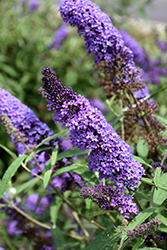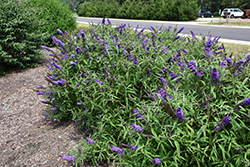It's all about ...
plants

Purple Emperor Butterfly Bush
Buddleia davidii 'Purple Emperor'
Height: 5 feet
Spread: 4 feet
Sunlight:
![]()
Hardiness Zone: 6b
Other Names: Summer Lilac
Description:
A valuable garden plant with showy purple spikes of flowers in late summer when little else blooms, and attracts butterflies; may treat as a perennial and cut it back to the ground each spring as it regrows vigorously and blooms on new wood
Ornamental Features
Purple Emperor Butterfly Bush features showy panicles of fragrant purple flowers at the ends of the branches from mid summer to mid fall. The flowers are excellent for cutting. Its tomentose narrow leaves remain grayish green in colour throughout the season.
Landscape Attributes
Purple Emperor Butterfly Bush is an open multi-stemmed perennial with an upright spreading habit of growth. Its medium texture blends into the garden, but can always be balanced by a couple of finer or coarser plants for an effective composition.
This is a relatively low maintenance plant, and is best cut back to the ground in late winter before active growth resumes. It is a good choice for attracting bees, butterflies and hummingbirds to your yard, but is not particularly attractive to deer who tend to leave it alone in favor of tastier treats. It has no significant negative characteristics.
Purple Emperor Butterfly Bush is recommended for the following landscape applications;
- Mass Planting
- General Garden Use
- Container Planting
Planting & Growing
Purple Emperor Butterfly Bush will grow to be about 5 feet tall at maturity, with a spread of 4 feet. It tends to be leggy, with a typical clearance of 1 foot from the ground, and should be underplanted with lower-growing perennials. Although it is technically a woody plant, this fast-growing plant can be expected to behave as a perennial in our climate if planted outdoors over the winter, usually regrowing from its base (crown) the following year. As such, gardeners should take into consideration that it will perform differently than it would in its native habitat.
This plant should only be grown in full sunlight. It is very adaptable to both dry and moist locations, and should do just fine under typical garden conditions. It is not particular as to soil type or pH, and is able to handle environmental salt. It is highly tolerant of urban pollution and will even thrive in inner city environments. This is a selected variety of a species not originally from North America.
Purple Emperor Butterfly Bush is a fine choice for the garden, but it is also a good selection for planting in outdoor pots and containers. With its upright habit of growth, it is best suited for use as a 'thriller' in the 'spiller-thriller-filler' container combination; plant it near the center of the pot, surrounded by smaller plants and those that spill over the edges. It is even sizeable enough that it can be grown alone in a suitable container. Note that when growing plants in outdoor containers and baskets, they may require more frequent waterings than they would in the yard or garden. Be aware that in our climate, most plants cannot be expected to survive the winter if left in containers outdoors, and this plant is no exception. Contact our experts for more information on how to protect it over the winter months.
This plant is not reliably hardy in our region, and certain restrictions may apply; contact the store for more information.

